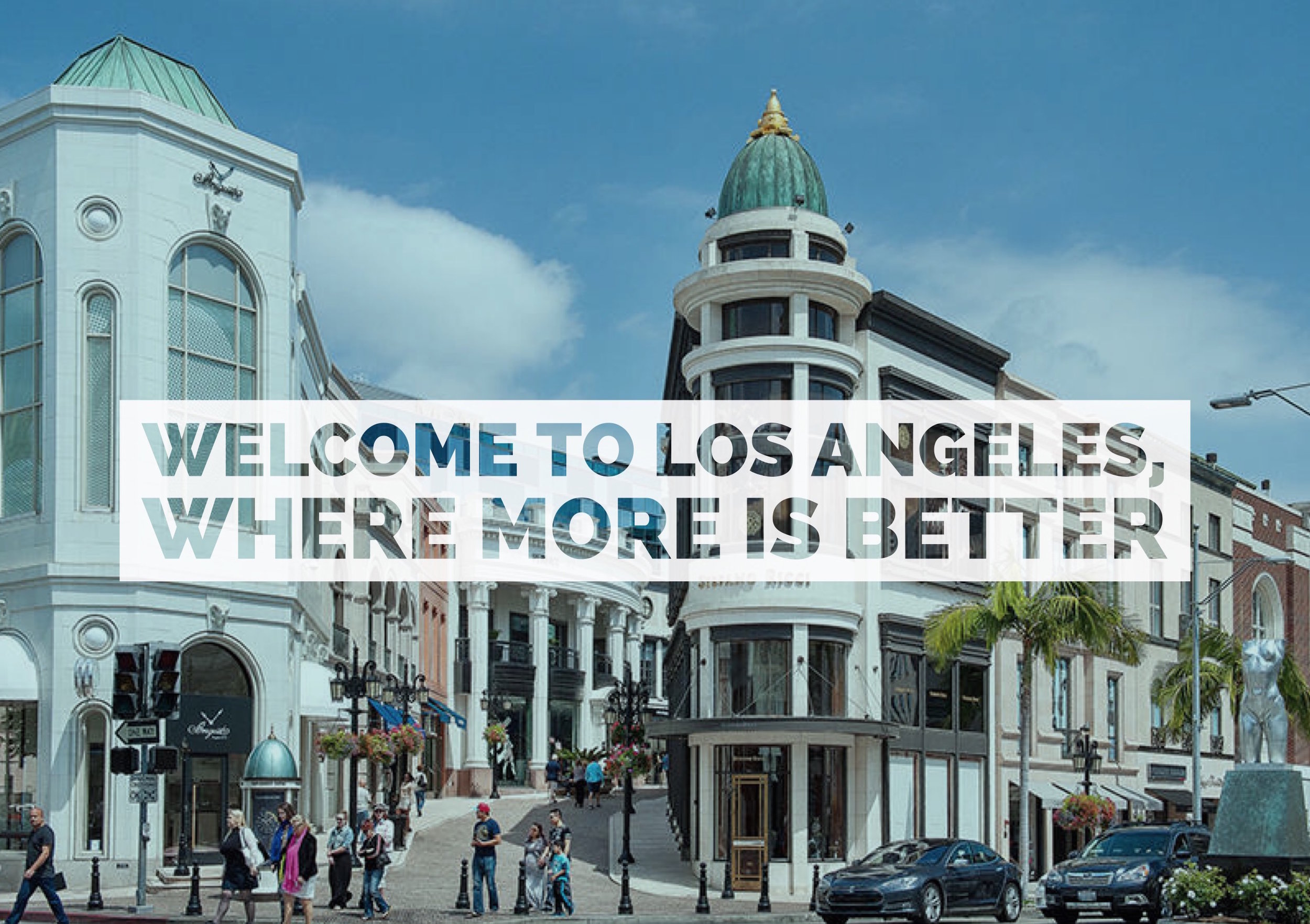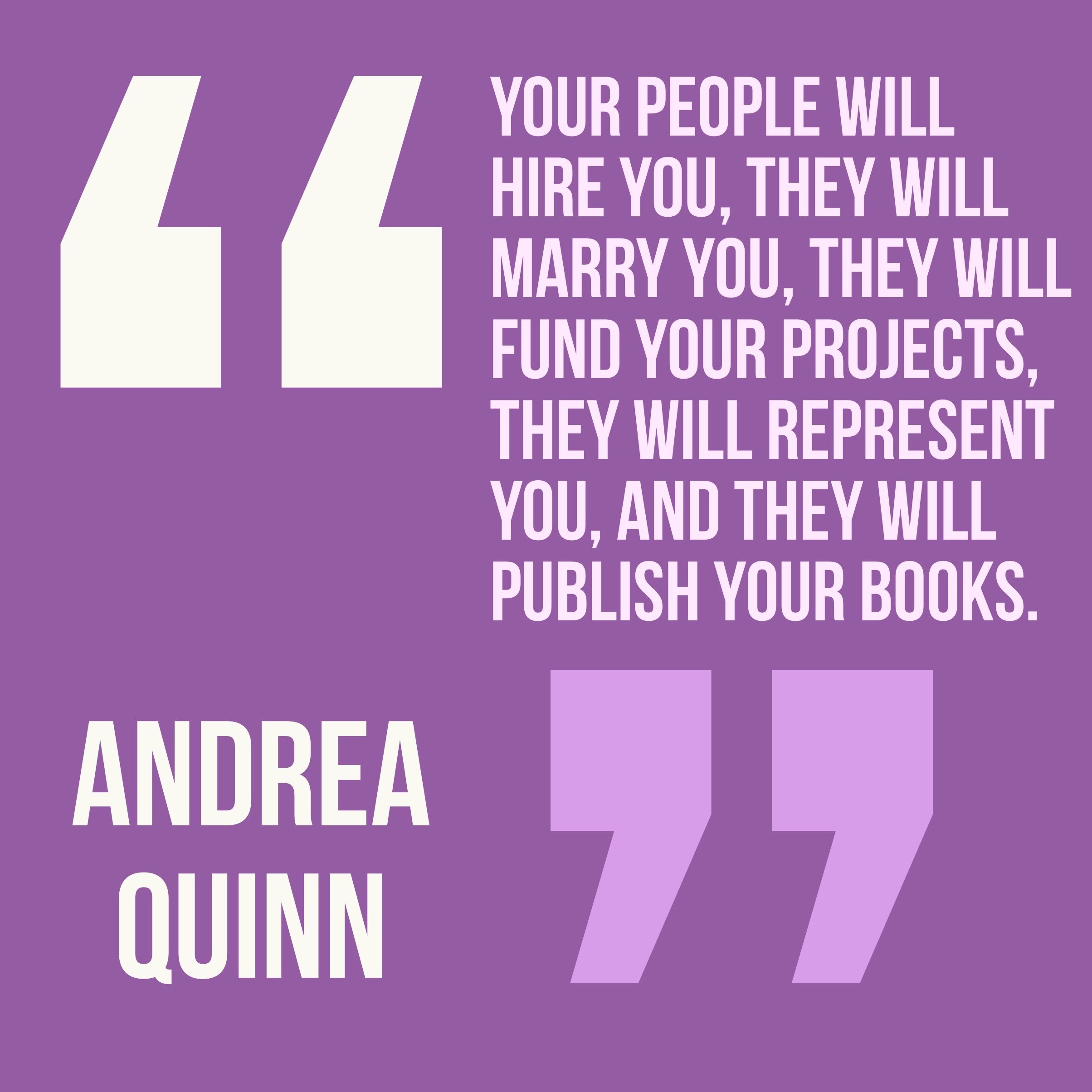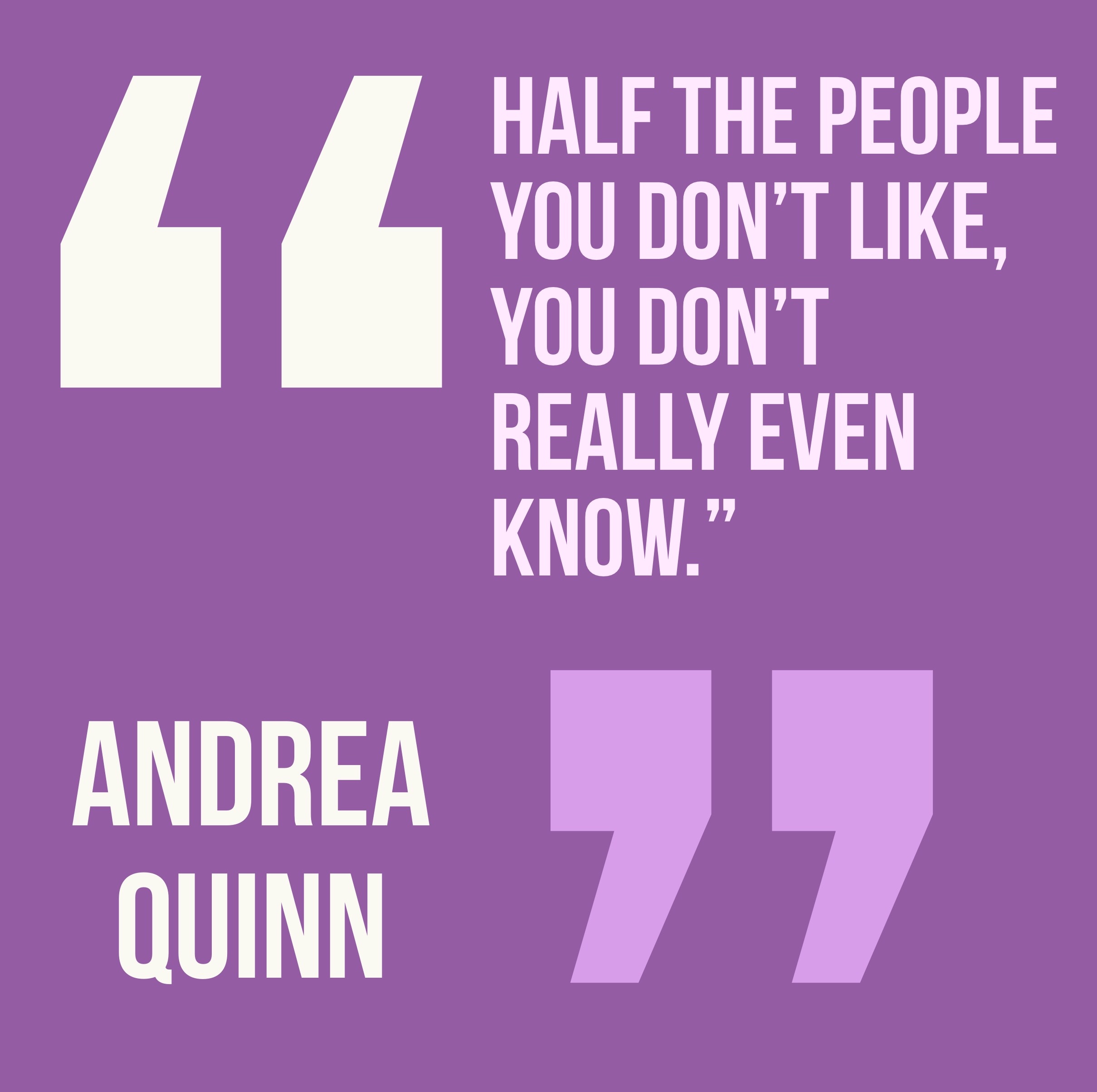What Women Don't Know About Themselves, But Should—A NEW Perspective with Life Coach Andrea Quinn
Andrea Quinn, Empowerment Coach
In her book, Communion: The Female Search for Love, author and social activist bell hooks writes:
"Females are rewarded more when we experience ourselves and act as though we are flawed, insecure, or especially dependent and needy."
...Oh, REALLY?
Enter Andrea Quinn, an empowerment coach who has transformed thousands of lives across the nation, including here in Hollywood—with her Quinn Essentials curriculum through which she teaches nine powerful tools in workshops for women, and even for big corporations.
Many of the problems women experience, Quinn tells Beyond The Interview, start from SELF-JUDGMENT.
Comparison, for example, is self-judgment. People are so hard on themselves—especially women—that they take that negative internal monologue and begin to project it out into the world.
Unfortunately for society, women (and men) are now comparing themselves even more so, especially owing to a virtual reality—like Instagram posts.
"A lot of people begin to feel jealous of people, and envious," Quinn says.
"A lot of people don't like people that are confident because it makes them feel uncomfortable, because they're not."
Bell Hooks agrees and writes on the topic:
Lots of women can hang tight with one another and bond if one of them has a problem or if they share a problem. Affirming another woman’s success is the difficult issue for many females...
...It is rooted in the same fairytale logic that teaches us that only one female can win the day or be chosen.
Women do have a hard time with one another—that is until, Quinn says, they really get the value of other women—and that's one reason why her groups are so successful. Women ranging from their 20s to 70s take Quinn's workshop.
Research shows that younger women have a harder time dealing with each other, and it is often fueled by the quest for a man or for a job—as if it's a zero-sum game—that propels deep levels of insecurity in women, and a distaste for one another.
In The Atlantic, one writer devotes the entirety of her research to answer one question: Why do women bully each other at work?
Quinn points out a powerful truth, though. Get this:
"Half the people you don't like, you don't really even know."
And the insecurity? Where does that come from?
"I think women learn to be insecure because they've had to struggle to find their voice in the world. They don't want things taken from them," the life coach says. "But the only way to change is to work on understanding the value of other women around them. Then, they can work on self-esteem and self-respect and self-honor and self-dignity."
Gretchen Rubin, author of The Happiness Project, also emphasizes the importance of eliminating jealousy in order to be happy. But how do we tackle jealousy when it creeps up on us? Quinn has a solution for this, too.
"I always tell my clients—when someone has something we want, that they’ve given us permission to go for it.
"You have to remind yourself: If they can do it—you can do it," Quinn says. "Anybody can have whatever they want. It's their own limited beliefs that prevent people from having what they want."
In other words, if you want a really amazing life, you have to look at your gifts.
“And then you must accept your gifts, and if you don't know what you're good at? That's your job to find out."
The profound problems is when women don't know what their gifts are.
"What women do know—is know all the places they come up short. Every place they're not, and everything they don't have, and everything they think that if they fix it, they'll be better, and that's simply not true."
What's wrong with you is simply none of your business, according to Quinn. So, you have to ask yourself: What's right about you? Why do people love you? And as you expand that more and more and more, your life will be indicative of that thought process.
Quinn tells BTI that unfulfilled expectations can also affect women, especially in this digital age. "You see what looks like the perfect couple doing the perfect thing, and you turn to your mate, and say, 'How come we don't look like this? How come we're not doing this?' And the truth is, most of these Instagram and Facebook posts are an illusion anyway."
In Los Angeles, where she lives, Quinn identifies an even bigger problem.
"The culture of Los Angeles can be very showy," she says. "Bigger is better—more is better. It's Hollywood. It's about wanting the best, being the best, being the most popular, having the most. And that puts a lot of pressure on people."
Another source of pressure for women can come from remaining single for long periods of time.
Take, for example, this uber-popular article from CNN: "There's never been a better time to be single". Note the significant shift in the way people think about marriage and relationships. Some key points:
Marriage is no longer considered a key part of adulthood
A relationship doesn't mean higher self-esteem
Marriage doesn't mean better health
True. But the title seems to celebrate and encourage being single over being in a relationship.
"Here's what I know," Quinn tells us. "Traditional marriage, I understand isn't for everyone—but what I know about humans, is that they need other human beings. We need relationships, and we need people. And there are studies that show isolation equals depression. With the way technology is today, people can have 6600 friends on Facebook and be the loneliest person in town."
Quinn says people also need family and community in order to thrive.
But what kind of community?
You need to be with like-minded individuals. When you're with people who aren’t like-minded or don’t have similar values, they’re "NOT YOUR PEOPLE"—a phrase Quinn coined, and devotes an entire one-hour class to. Here's the premise of this phrase:
“We know IMMEDIATELY how we feel with someone. We know if someone makes us feel comfortable, if we feel safe around them, if we trust them, or if they’re being genuine and kind to us.”
Quinn says that if you acknowledge who and what you are, and you can’t identify your core characteristics and values in other people, that relationship probably won’t work.
And here’s the best part:
They’re not bad if they’re not your people.
“If they’re not your people, you’re not their people. Game over. There is no ego involved. Not everybody is everybody’s people,” Quinn says.
Perfect example of this?
“Don’t you have one of those friends, that, the second you met her, you were just friends for life. And don’t you have those people that you’ve known your whole life, and you see them all the time, and you just can’t get along with them?”
Once you find your people, you can navigate so quickly because you know who you are, says Quinn. But what about people with different opinions? Do we cut them out too? No, she says. “We can learn from people who have different viewpoints. They’re not bad or wrong. They’re just different.”
This is the habit that Quinn gets women to break:
Women have wasted too much of their lives trying to make ‘not their people,’ their people.
Your job is to find YOUR PEOPLE.
Your people will hire you, they will marry you, they will fund your projects, they will represent you, and they will publish your books.
How refreshing, right!?
But there ARE challenges in identifying your people, and getting rid of those who are not your people. For example, communities and families alike can put a lot of pressure on their members to conform to their beliefs, ideals, and values in order to save face and remain a part of the tribe.
“I’m not saying to disrespect what your family or community wants, but that way of thinking doesn’t work anymore. Keeping things in, ignoring problems, keeping things repressed—that’s why we have so many social issues.”
Quinn says the kids of the future are finally deciding to do what they want. “And the parents feel like they’re losing control, but it’s up to each generation to do a little better each time.”
And we are doing better. We are reading more self-help books. We are attending seminars. We have female researchers and leaders like Gabrielle Bernstein, Esther Perel, Marie Forleo, Danielle LaPorte, and Brené Brown, who are teaching women invaluable lessons across the board.
All of the effort we put into working on ourselves is not going unnoticed. Quinn says it is relatively easy to help both women and men change their perspectives, once they are open to it.
“A lot of actors and actresses, for example, will tell me something like ‘my friend got the part and she doesn’t even have a resume.’ And I say ‘GOOD! That just tells you that the networks are hiring people without resumes! This is awesome news!’” This perspective is taught over and over again in Quinn’s workshops.
"I remember when Oprah bought her network, somebody said to me ‘Oh my G-d, Oprah Winfrey bought a network’ and I said “Oh my G-d, I am so excited. She just gave every woman permission to own a network.’”—not “Oh, it’s Oprah, she’s the only one who can do it.”
And it’s true, because women do have so much power, and talent, and empathy, and skill. So what do we need to change here?
"Women often give their power away. We want them to like us, we want them to marry us, we want them to not judge us, so we feel like we have to sacrifice something."
To this powerful statement, Quinn adds: “I don’t think you have to sacrifice anything. I think you have to be who you are. I love a person who is sitting across from me with confidence—it empowers me. If you’re aware of your gifts, and people around you think you’re cocky—sorry, but they’re just not your people!”
On becoming aware of and accepting our gifts:
One of the first tools Quinn teaches in her Quinn Essentials workshop is “self-acceptance.” But most people misunderstand the term, says Quinn. “Self-acceptance is not, here’s where I’m good, here’s where I’m bad, and I’m going to love the whole package. That’s not possible.”
Self-acceptance is: “this is where I’m magnificent, and I can own it. And I don’t have to feel bad about it, and I don’t have to feel bad that YOU feel bad about it”—alluding to the apologetic nature we have adopted as women when we display self-confidence.
Quinn says that her primary goal in all of this is to help women feel balanced, because a balanced woman is unstoppable. “It’s when we are off balance, that things start to affect us.“
“We can end up making bad decisions, getting into stressful situations, and not making the proper choices for our lives because we are so off balance.”
And what exactly does an unbalanced female feel like?
“We’re just off, and somewhere we are so stressed out because we are trying to do it all—we feel like we have to put our energy into many things. So let’s say we are really amazing at work, but we know we are slacking at home. It’s really hard to have a work-life balance for women, without proper tools that can get them balanced. And when you finally are balanced, you will feel a sense of clarity, and you won’t make choices based on stress or or fear.”
We are, according to Quinn, headed in the right direction, though.
“I think the courage women have to tell the truth about how they’re feeling now, or what has happened to them, is giving them a newfound sense of freedom in the ability to articulate,” she says, alluding to the new post-Weinstein era and the #metoo movement. “Every change is painful. It’s like giving birth. But I think there is a lot of awareness, and a lot of consciousness that is being raised. I don’t look at it like it’s a war on men. It is a shift in perspective, and a way for women to open themselves and not hide who they are.“
According to Quinn, the consciousness and awareness can also help us think more globally.
Everything you’re doing is here to help the world, she says.
“This world needs people to take care of it, and you have to ask yourself: What are you going to do, so that you can be more successful, so that you can help who? You have got to give, not just of your money, but of your time. And try to give before you can.”
So where are you going to make a contribution?
“Because as soon as you start giving, you will see how much more you receive. Watch the energy that starts coming to you—it changes your life more, because there is nothing more empowering than feeling so great about helping others—your way, whatever that looks like.”




